EFA Members
EFA Team

Professor Simon Leonard is a Professor of the Learning Sciences. They lead a team who—given all we know from multiple domains of research on learning and development – seek to understand and implement the school and classroom practices and environments that support students to develop the capabilities of tomorrow.
Their research and design projects have been supported by in excess of $10 million in grants, and have been reported through over 50 scholarly publications. A major focus of their current work is on the development of early career researchers in the Learning Sciences. They supervise and/or mentor numerous doctoral and post-doctoral researchers. They were pleased to win their Academic Unit’s award for Higher Degree supervision and are even more pleased when the people they mentor publish their work or secure the funding needed to pursue their research agenda.

Professor Simon Leonard is a Professor of the Learning Sciences. They lead a team who—given all we know from multiple domains of research on learning and development – seek to understand and implement the school and classroom practices and environments that support students to develop the capabilities of tomorrow.
Their research and design projects have been supported by in excess of $10 million in grants, and have been reported through over 50 scholarly publications. A major focus of their current work is on the development of early career researchers in the Learning Sciences. They supervise and/or mentor numerous doctoral and post-doctoral researchers. They were pleased to win their Academic Unit’s award for Higher Degree supervision and are even more pleased when the people they mentor publish their work or secure the funding needed to pursue their research agenda.

Katherine works with schools and education systems to strengthen future-focused leadership, innovation, and school improvement. As Senior Research Fellow at Adelaide University’s Education Futures Academy, she leads the Teaching Futures Pathway, a key initiative within the Education Futures Academy and the Australian Government’s High Achieving Teachers Program. She brings expertise in adaptive leadership, strategic change, and educational innovation, developed through senior and executive roles, including Director of Centre of Innovation, across sectors and in cross-sector settings in Australia and the UK. Her practice-led research explores how schools function as dynamic ecosystems and learning organisations shaped by diverse influences. Katherine supports leaders and educators through contextually grounded approaches that promote professional agency, collaboration, futures-oriented learning, and sustainable system renewal.

Katherine works with schools and education systems to strengthen future-focused leadership, innovation, and school improvement. As Senior Research Fellow at Adelaide University’s Education Futures Academy, she leads the Teaching Futures Pathway, a key initiative within the Education Futures Academy and the Australian Government’s High Achieving Teachers Program. She brings expertise in adaptive leadership, strategic change, and educational innovation, developed through senior and executive roles, including Director of Centre of Innovation, across sectors and in cross-sector settings in Australia and the UK. Her practice-led research explores how schools function as dynamic ecosystems and learning organisations shaped by diverse influences. Katherine supports leaders and educators through contextually grounded approaches that promote professional agency, collaboration, futures-oriented learning, and sustainable system renewal.
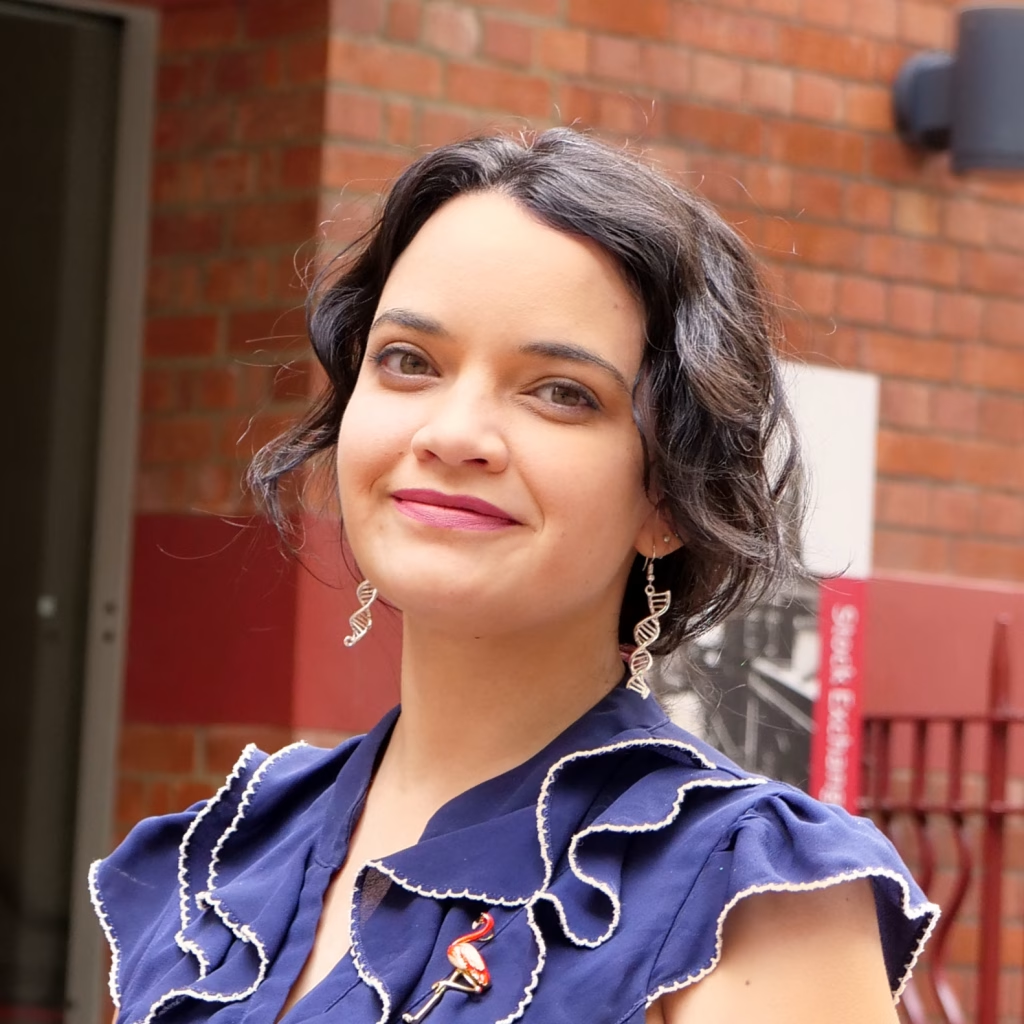
Debbie is a research fellow at Adelaide University’s Education Futures Academy whose work focuses on understanding complexity and designing for complex futures. Her interests are systems thinking, how science and sustainability are taught in schools, and games for developing critical thinking.
Debbie believes good research should be accessible, so she translates complex information into practical and actionable outputs, and co-creating new knowledge in partnership. Currently, Debbie leads the educational design team as part of the Education Futures Academy, focusing on effective research translation that considers context and flexibility.
Debbie has a PhD in Molecular Genetics and extensive experience as a science communicator.

Debbie is a research fellow at Adelaide University’s Education Futures Academy whose work focuses on understanding complexity and designing for complex futures. Her interests are systems thinking, how science and sustainability are taught in schools, and games for developing critical thinking.
Debbie believes good research should be accessible, so she translates complex information into practical and actionable outputs, and co-creating new knowledge in partnership. Currently, Debbie leads the educational design team as part of the Education Futures Academy, focusing on effective research translation that considers context and flexibility.
Debbie has a PhD in Molecular Genetics and extensive experience as a science communicator.

Sam works with schools and education systems to drive meaningful and sustainable change. With over 20 years of practical experience, he brings a deep understanding of how learning can be strengthened through self-regulation, metacognition and motivation. Sam has extensive knowledge of how teachers’ beliefs and ways of thinking about knowledge shape their pedagogical decisions, and he uses this to support professional growth and reflection. His work focuses on translating educational theory and research into practical, usable strategies that help teachers and leaders build complex capabilities in their students, while deepening their own understanding of effective teaching and learning.

Sam works with schools and education systems to drive meaningful and sustainable change. With over 20 years of practical experience, he brings a deep understanding of how learning can be strengthened through self-regulation, metacognition and motivation. Sam has extensive knowledge of how teachers’ beliefs and ways of thinking about knowledge shape their pedagogical decisions, and he uses this to support professional growth and reflection. His work focuses on translating educational theory and research into practical, usable strategies that help teachers and leaders build complex capabilities in their students, while deepening their own understanding of effective teaching and learning.

Dr Lisa Smith is a Research Associate with the Adelaide University’s Education Futures Academy, where she co-leads the qualitative research team within a program of university-school partnered research. Her work focuses on equitable schooling practices and improving schooling and higher education outcomes for students living in disadvantaged communities. Prior to working at Adelaide University, she was a secondary school teacher and leader in the South Australian Department for Education.
Lisa’s work is predominantly informed by critical pedagogy, critical policy studies, and sociological theory to understand the social conditions that shape teachers’ and leaders’ work and students’ educational experiences. At the EFA, she brings this lens to collaborative projects with schools and industry partners, where a pragmatic and responsive approach is taken to navigate local challenges and co-construct context-sensitive opportunities for change.
Lisa also leads developmental evaluation work that supports research-informed decision-making and continuous improvement. Drawing on Pragmatic Adaptive Modelling and value creation cycles, this work supports partners to surface system-level tensions and enablers, make sense of complexity, and identify aspects of the system where change is required.

Dr Lisa Smith is a Research Associate with the Adelaide University’s Education Futures Academy, where she co-leads the qualitative research team within a program of university-school partnered research. Her work focuses on equitable schooling practices and improving schooling and higher education outcomes for students living in disadvantaged communities. Prior to working at Adelaide University, she was a secondary school teacher and leader in the South Australian Department for Education.
Lisa’s work is predominantly informed by critical pedagogy, critical policy studies, and sociological theory to understand the social conditions that shape teachers’ and leaders’ work and students’ educational experiences. At the EFA, she brings this lens to collaborative projects with schools and industry partners, where a pragmatic and responsive approach is taken to navigate local challenges and co-construct context-sensitive opportunities for change.
Lisa also leads developmental evaluation work that supports research-informed decision-making and continuous improvement. Drawing on Pragmatic Adaptive Modelling and value creation cycles, this work supports partners to surface system-level tensions and enablers, make sense of complexity, and identify aspects of the system where change is required.

Dr Maria Vieira holds a PhD in STEM and is a Lecturer in Education Futures at Adelaide University. Her work is grounded in a deep commitment to advancing educational equity through innovative, research-informed teaching practices that nurture creativity. In her current role, she leads key initiatives in course coordination, curriculum development, and outreach programs. She coordinates the research-based STEM Girls Academy program, establishing and nurturing partnerships with over 30 STEM industry collaborators in Adelaide University’s metropolitan and regional areas. The program reaches over 200 school girls annually across South Australia and Victoria, successfully contributing to a positive change in attitudes towards STEM through creative practices.

Dr Maria Vieira holds a PhD in STEM and is a Lecturer in Education Futures at Adelaide University. Her work is grounded in a deep commitment to advancing educational equity through innovative, research-informed teaching practices that nurture creativity. In her current role, she leads key initiatives in course coordination, curriculum development, and outreach programs. She coordinates the research-based STEM Girls Academy program, establishing and nurturing partnerships with over 30 STEM industry collaborators in Adelaide University’s metropolitan and regional areas. The program reaches over 200 school girls annually across South Australia and Victoria, successfully contributing to a positive change in attitudes towards STEM through creative practices.

With over 20 years of experience across secondary and tertiary education, Kim is passionate about empowering students to realise their potential and make confident, informed decisions about their futures. Her work focuses on guiding secondary school and university students in shaping their career aspirations by fostering self-belief, resilience, and a strong sense of personal agency.
Currently, she collaborates with a wide range of internal and external stakeholders to build meaningful partnerships that support student success. Within the Education Futures Academy, she is recognised as the go-to person – a connector who brings people, ideas, and opportunities together to drive positive outcomes.

With over 20 years of experience across secondary and tertiary education, Kim is passionate about empowering students to realise their potential and make confident, informed decisions about their futures. Her work focuses on guiding secondary school and university students in shaping their career aspirations by fostering self-belief, resilience, and a strong sense of personal agency.
Currently, she collaborates with a wide range of internal and external stakeholders to build meaningful partnerships that support student success. Within the Education Futures Academy, she is recognised as the go-to person – a connector who brings people, ideas, and opportunities together to drive positive outcomes.

Tamika Roach-Attard has a background in psychology, career education, and primary teaching. As a part of the Education Futures Academy, she is passionate about delivering career development programs in the Northern suburbs of Adelaide while supporting disadvantaged students through pre-access equity initiatives. She builds partnerships with schools to offer hands-on experiences that boost students’ awareness, self-efficacy, and agency in career education.
Tamika leads and coordinates the Careers Compass programs for Year 6 and Year 10 students, aligning with ACARA V9 General Capabilities, the Australian Blueprint for Career Development, and the SACE Exploring Identities and Futures subject. She also recruits, mentors, and trains domestic and international pre-service teachers—both undergraduate and postgraduate—to participate in these programs, enhancing their confidence and experience in educational settings before graduation.
Additionally, Tamika is an approved supervisor for psychology placement students undertaking their field placement. She mentors them in applying psychological theory and skills in real-world educational environments. Through her work, Tamika demonstrates a strong commitment to equity, education, and the career development of school students and future university graduates.

Tamika Roach-Attard has a background in psychology, career education, and primary teaching. As a part of the Education Futures Academy, she is passionate about delivering career development programs in the Northern suburbs of Adelaide while supporting disadvantaged students through pre-access equity initiatives. She builds partnerships with schools to offer hands-on experiences that boost students’ awareness, self-efficacy, and agency in career education.
Tamika leads and coordinates the Careers Compass programs for Year 6 and Year 10 students, aligning with ACARA V9 General Capabilities, the Australian Blueprint for Career Development, and the SACE Exploring Identities and Futures subject. She also recruits, mentors, and trains domestic and international pre-service teachers—both undergraduate and postgraduate—to participate in these programs, enhancing their confidence and experience in educational settings before graduation.
Additionally, Tamika is an approved supervisor for psychology placement students undertaking their field placement. She mentors them in applying psychological theory and skills in real-world educational environments. Through her work, Tamika demonstrates a strong commitment to equity, education, and the career development of school students and future university graduates.

Joe supports the Education Futures Academy through a dual focus on digital systems and program coordination. He manages the Academy’s web platforms and internal IT infrastructure, developing bespoke solutions to streamline workflows and reduce manual processes. Joe regularly works with team members to translate ideas into practical systems, ensuring tools are aligned with real needs and are easy to use.
Alongside his technical responsibilities, Joe contributes to the planning and coordination of several EFA programs, with a particular focus on backend logistics through automating bookings, data tracking, and reporting. He also collaborates with internal and external stakeholders, including school partners and academic staff, to support effective program delivery. He translates complex problems into clear, workable solutions that enhance team operations and improve outcomes across the Academy’s initiatives.

Joe supports the Education Futures Academy through a dual focus on digital systems and program coordination. He manages the Academy’s web platforms and internal IT infrastructure, developing bespoke solutions to streamline workflows and reduce manual processes. Joe regularly works with team members to translate ideas into practical systems, ensuring tools are aligned with real needs and are easy to use.
Alongside his technical responsibilities, Joe contributes to the planning and coordination of several EFA programs, with a particular focus on backend logistics through automating bookings, data tracking, and reporting. He also collaborates with internal and external stakeholders, including school partners and academic staff, to support effective program delivery. He translates complex problems into clear, workable solutions that enhance team operations and improve outcomes across the Academy’s initiatives.
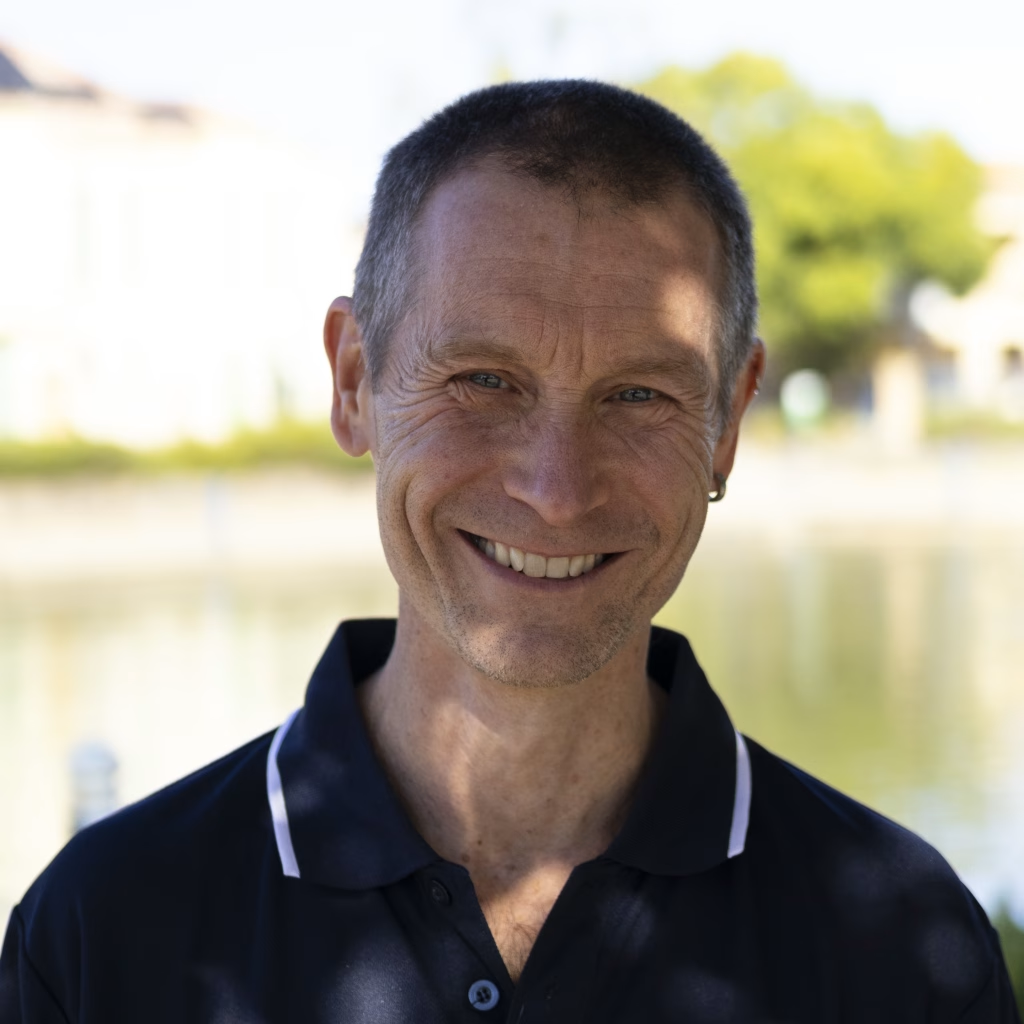
Nathaneal has 30 years experience in the Education sector, working across a range of roles including as a teacher in primary and secondary schools, Education Coordinator at interactive science centres, running a science communication business, and a lecturer in Science Education at UniSA and Flinders University. He is currently responsible for the development, coordination and implementation of many Education Futures Outreach bookable programs, including the Year 11 and 12 Physics programs, the Aviation, Engineering Day, Real World Maths, STEM Day Out and STEM for Humanity programs, the Planetarium Plus program (in conjunction with the Adelaide Planetarium), and the Senior Maths and Science (SMS) and SAASTA programs.

Nathaneal has 30 years experience in the Education sector, working across a range of roles including as a teacher in primary and secondary schools, Education Coordinator at interactive science centres, running a science communication business, and a lecturer in Science Education at UniSA and Flinders University. He is currently responsible for the development, coordination and implementation of many Education Futures Outreach bookable programs, including the Year 11 and 12 Physics programs, the Aviation, Engineering Day, Real World Maths, STEM Day Out and STEM for Humanity programs, the Planetarium Plus program (in conjunction with the Adelaide Planetarium), and the Senior Maths and Science (SMS) and SAASTA programs.
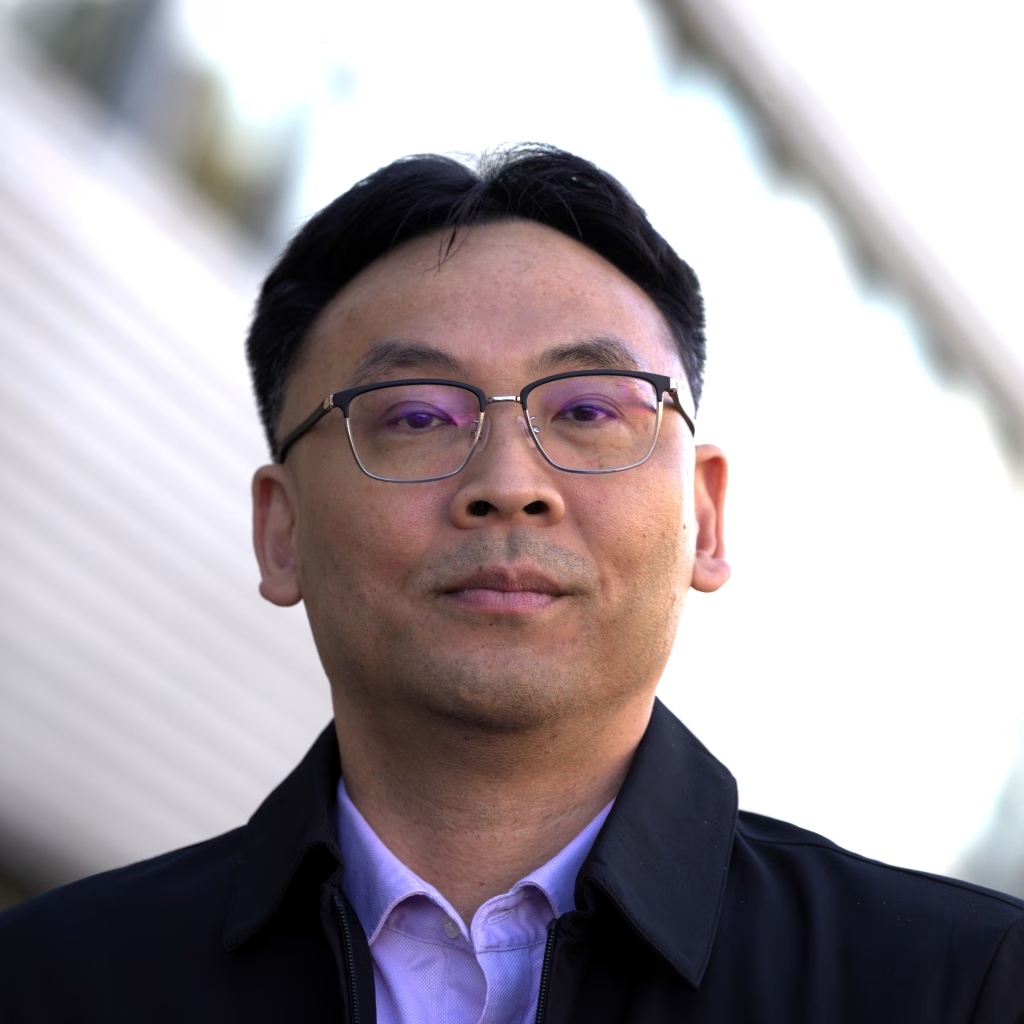
David Chan is a passionate and accomplished STEM educator and technical services leader based in South Australia. With extensive experience in managing 3D printing facilities, advanced manufacturing technologies, and collaborative maker spaces, David plays a key role in supporting innovation and hands-on learning in university and school environments.
He is a strong advocate for youth engagement in STEM and has a long-standing involvement in the internationally recognised STEM Racing program (formerly known as F1 in Schools), where he has mentored teams to outstanding success – including a World Champions title in 2012 and Runner-Up in 2023. In recognition of his exceptional contributions to STEM education, David was awarded the John Button Memorial Award by Re-Engineering Australia Foundation in 2023.
David’s expertise spans 3D printing, digital fabrication, engineering education, and technical operations. He is also a trusted adviser on technology integration for classrooms and universities, providing practical solutions and strategic guidance to improve learning outcomes and streamline technical services.
Always ready to collaborate, David continues to inspire the next generation of problem-solvers through his dedication, leadership, and hands-on support of cutting-edge educational initiatives.

David Chan is a passionate and accomplished STEM educator and technical services leader based in South Australia. With extensive experience in managing 3D printing facilities, advanced manufacturing technologies, and collaborative maker spaces, David plays a key role in supporting innovation and hands-on learning in university and school environments.
He is a strong advocate for youth engagement in STEM and has a long-standing involvement in the internationally recognised STEM Racing program (formerly known as F1 in Schools), where he has mentored teams to outstanding success – including a World Champions title in 2012 and Runner-Up in 2023. In recognition of his exceptional contributions to STEM education, David was awarded the John Button Memorial Award by Re-Engineering Australia Foundation in 2023.
David’s expertise spans 3D printing, digital fabrication, engineering education, and technical operations. He is also a trusted adviser on technology integration for classrooms and universities, providing practical solutions and strategic guidance to improve learning outcomes and streamline technical services.
Always ready to collaborate, David continues to inspire the next generation of problem-solvers through his dedication, leadership, and hands-on support of cutting-edge educational initiatives.
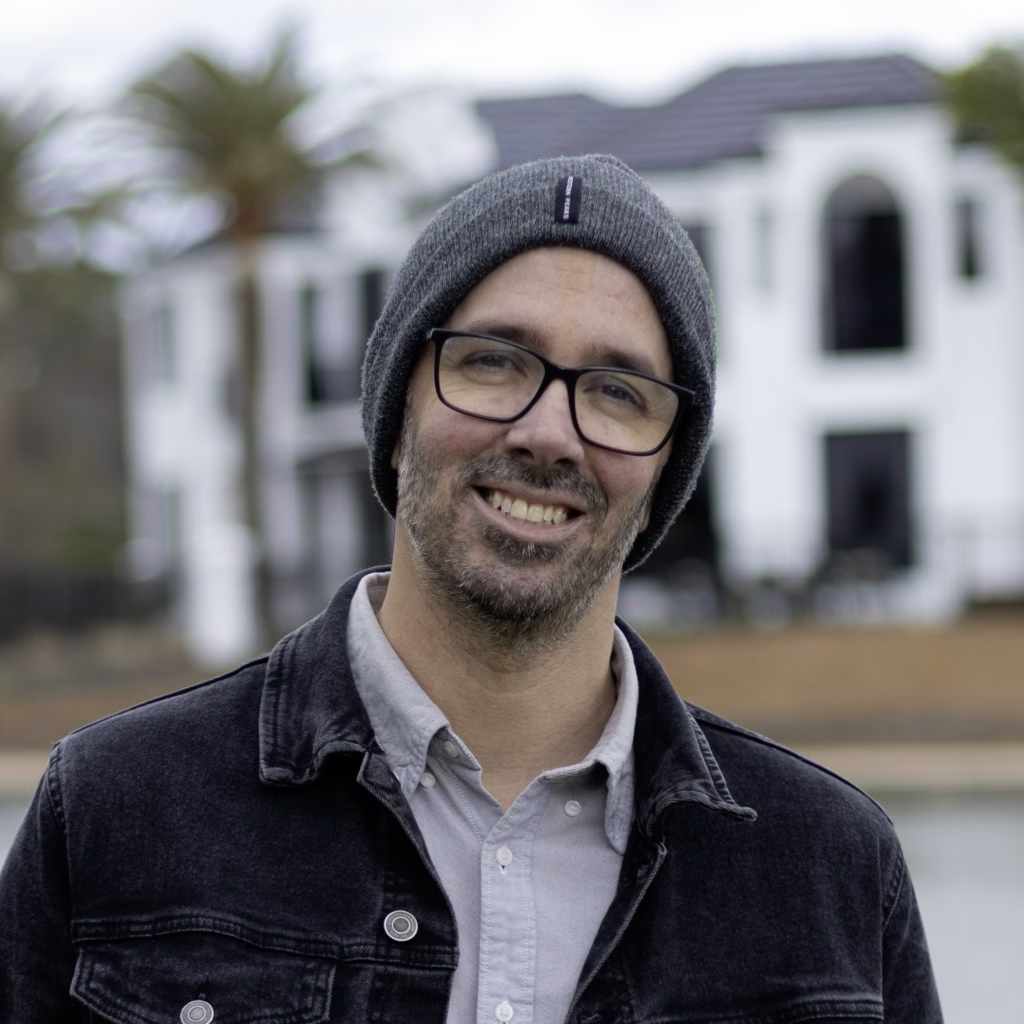
Dan is an Educational Designer at Adelaide University where he works with the Education Futures Academy to develop innovative teaching materials for Early Career Teachers. His work includes the translation of research from the learning sciences into a wide range of effective educational resources.
With a career that began in the fine arts worlds of Painting and Photography, Dan brought his practice into the digital fields of video editing and motion graphics. After working in the advertising and television spheres, Dan sought to share his knowledge in a classroom setting which has culminated in over a decade of teaching experience in both high school and primary school.
Dan possesses a passion for communicating complex ideas effectively and a broad range of skills to create engaging video, animation and graphic resources for a wide audience. Dan believes in the power that education and creativity can have to enrich lives and solve problems.

Dan is an Educational Designer at Adelaide University where he works with the Education Futures Academy to develop innovative teaching materials for Early Career Teachers. His work includes the translation of research from the learning sciences into a wide range of effective educational resources.
With a career that began in the fine arts worlds of Painting and Photography, Dan brought his practice into the digital fields of video editing and motion graphics. After working in the advertising and television spheres, Dan sought to share his knowledge in a classroom setting which has culminated in over a decade of teaching experience in both high school and primary school.
Dan possesses a passion for communicating complex ideas effectively and a broad range of skills to create engaging video, animation and graphic resources for a wide audience. Dan believes in the power that education and creativity can have to enrich lives and solve problems.

Nicole is a quantitative research analyst within the team who offers years of quantitative data analysis experience. She is currently completing her Master of Psychology (Clinical) and will be commencing her PhD with Education Futures in 2026.
Nicole assists the team with data analysis both internally and with external stakeholders and collaborates with the rest of the data team in producing high quality, reliable reports and data analyses for stakeholders and manuscripts for publications.

Nicole is a quantitative research analyst within the team who offers years of quantitative data analysis experience. She is currently completing her Master of Psychology (Clinical) and will be commencing her PhD with Education Futures in 2026.
Nicole assists the team with data analysis both internally and with external stakeholders and collaborates with the rest of the data team in producing high quality, reliable reports and data analyses for stakeholders and manuscripts for publications.
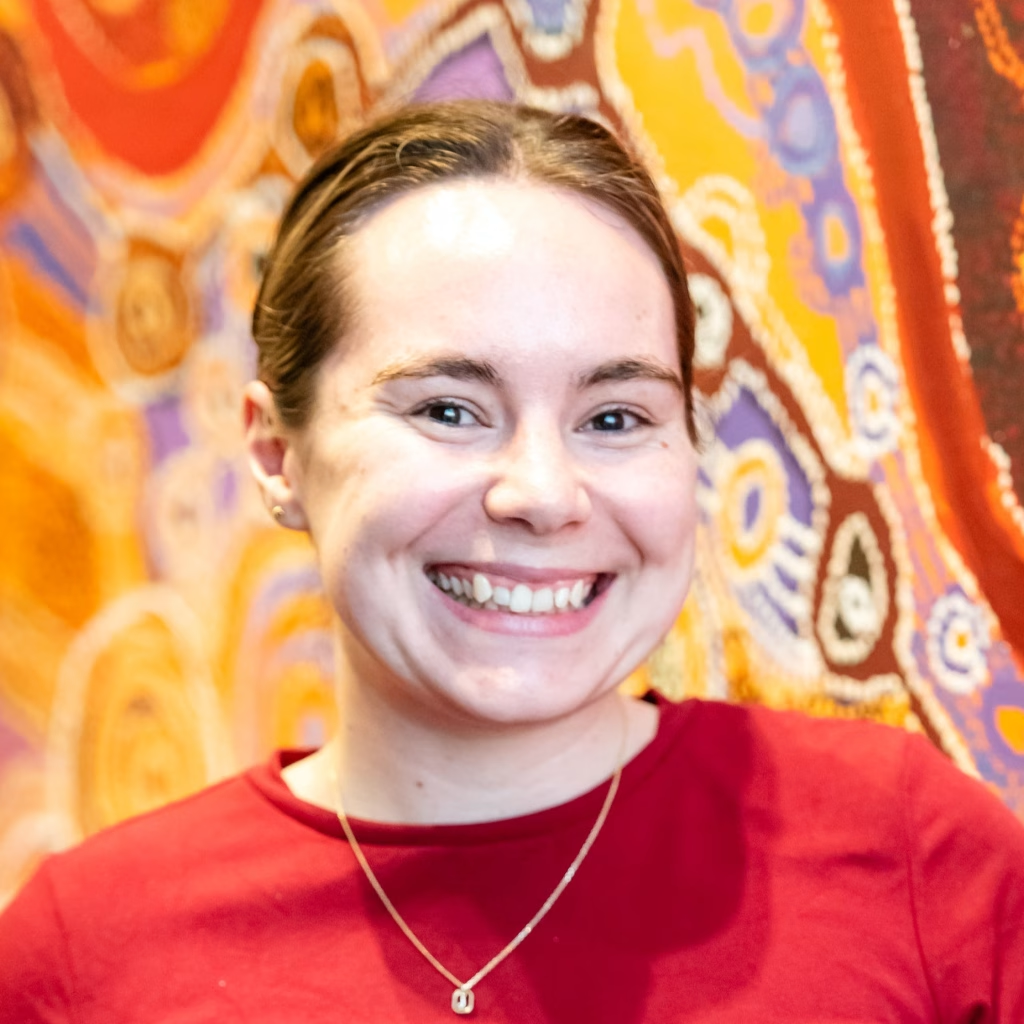
Ashley is a Research Assistant with the Education Futures Academy Data Team and a PhD candidate in Cognitive Neuroscience. Ashley has experience analysing quantitative and qualitative data across multiple research domains and is especially passionate about reproducible open-source research practices. This experience extends across neurolinguistics, business, and education and allows her to provide unique skills and perspectives on data analysis across these fields. She also has experience working with R, Python and Julia coding languages at all stages of the analysis pipeline. Her current education research explores both cross-sectional and longitudinal perspectives of school student attitudes to inform supportive and individual-level education interventions. Ashley also assists the team to collaborate with internal and external stakeholders to produce quantitative reports and publications.

Ashley is a Research Assistant with the Education Futures Academy Data Team and a PhD candidate in Cognitive Neuroscience. Ashley has experience analysing quantitative and qualitative data across multiple research domains and is especially passionate about reproducible open-source research practices. This experience extends across neurolinguistics, business, and education and allows her to provide unique skills and perspectives on data analysis across these fields. She also has experience working with R, Python and Julia coding languages at all stages of the analysis pipeline. Her current education research explores both cross-sectional and longitudinal perspectives of school student attitudes to inform supportive and individual-level education interventions. Ashley also assists the team to collaborate with internal and external stakeholders to produce quantitative reports and publications.
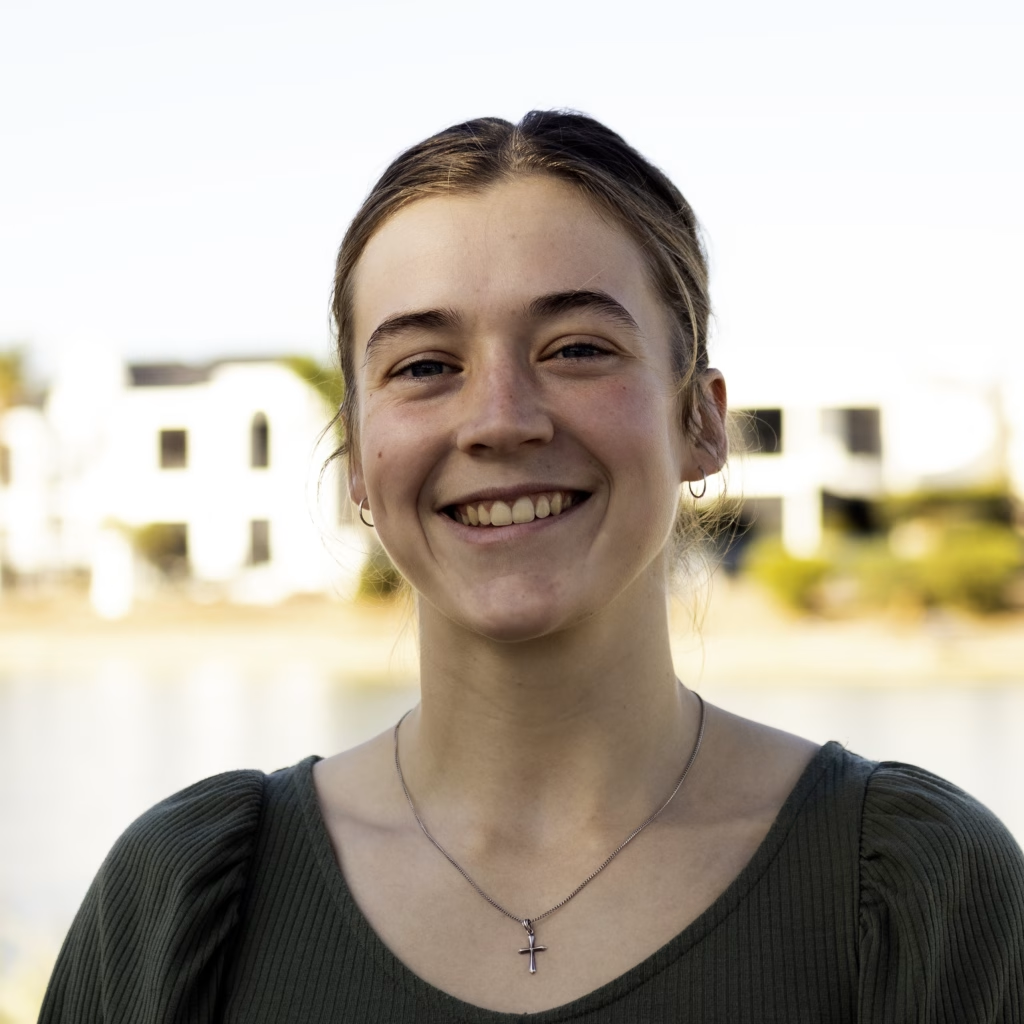
Maesie MacGillivray is a research assistant at Adelaide University. As part of the Education Futures Academy, she focuses on applying Cultural Historical Activity Theory through Pragmatic Adaptive Modelling to make sense of the complex world we live in, which extends to understanding the complexities that exist in the unique and evolving space that is education. She has been involved in projects across various areas of research, such as Inclusion, Sustainability, and Artificial Intelligence. Maesie is currently studying a Bachelor of Arts in English and Psychology and enjoys the way that a systems thinking approach surpasses traditional disciplines.

Maesie MacGillivray is a research assistant at Adelaide University. As part of the Education Futures Academy, she focuses on applying Cultural Historical Activity Theory through Pragmatic Adaptive Modelling to make sense of the complex world we live in, which extends to understanding the complexities that exist in the unique and evolving space that is education. She has been involved in projects across various areas of research, such as Inclusion, Sustainability, and Artificial Intelligence. Maesie is currently studying a Bachelor of Arts in English and Psychology and enjoys the way that a systems thinking approach surpasses traditional disciplines.

Tia is a professional graphic designer with over 7 years of experience, specialising in visual communication for educational and research-based content. Her work focuses on creating engaging illustrations and graphics that support learning and interactivity, as well as designing clear, compelling presentations, documents, and booklets tailored for diverse audiences. Tia also develops infographics that translate complex topics into accessible visuals, with a strong emphasis on clarity and impact.
Her expertise spans a wide range of subjects within the EFA, where she contributes to projects aimed at improving accessibility, understanding, and educational engagement. With a passion for thoughtful design and a keen eye for detail, Tia brings creative solutions that elevate the message and enhance the learning experience.

Tia is a professional graphic designer with over 7 years of experience, specialising in visual communication for educational and research-based content. Her work focuses on creating engaging illustrations and graphics that support learning and interactivity, as well as designing clear, compelling presentations, documents, and booklets tailored for diverse audiences. Tia also develops infographics that translate complex topics into accessible visuals, with a strong emphasis on clarity and impact.
Her expertise spans a wide range of subjects within the EFA, where she contributes to projects aimed at improving accessibility, understanding, and educational engagement. With a passion for thoughtful design and a keen eye for detail, Tia brings creative solutions that elevate the message and enhance the learning experience.



